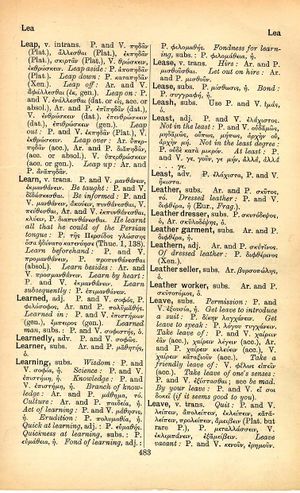leave
ὦ διάνοια, ἐὰν ἐρευνᾷς τοὺς ἱεροφαντηθέντας λόγους μὲν θεοῦ, νόμους δὲ ἀνθρώπων θεοφιλῶν, οὐδὲν ταπεινὸν οὐδ᾽ ἀνάξιον τοῦ μεγέθους αὐτῶν ἀναγκασθήσῃ παραδέχεσθαι → if, O my understanding, thou searchest on this wise into the oracles which are both words of God and laws given by men whom God loves, thou shalt not be compelled to admit anything base or unworthy of their dignity
English > Greek (Woodhouse)
subs.
Permission: P. and V. ἐξουσία, ἡ. Get leave to introduce a suit: P. δίκην λαγχάνειν. Get leave to speak: P. λόγου τυγχάνειν. Take leave of: P. and V. χαίρειν ἐᾶν (acc.), χαίρειν λέγειν (acc.), Ar. and P. χαίρειν κελεύειν (acc.), V. χαίρειν καταξιοῦν (acc.). Take a friendly leave of: V. φίλως εἰπεῖν (acc.). Take leave of one's senses: P. and V. ἐξίστασθαι; see be mad. By your leave: P. and V. εἴ σοι δοκεῖ (if it seems good to you). v. trans. Quit: P. and V. λείπειν, ἀπολείπειν, ἐκλείπειν, καταλείπειν, προλείπειν, ἀμείβειν (Plat. but rare P.), P. μεταλλάσσειν, V. ἐκλιμπάνειν, ἐξαμείβειν. Leave vacant: P. and V. κενοῦν, ἐρημοῦν. You have left no hope among us: V. οὐδʼ ἐλλέλοιπας ἐλπίδα (Eur., El. 609). Bequeath: Ar. and P. καταλείπειν, V. λείπειν (Eur., Alc. 688). Leave alone, let be: P. and V. ἐᾶν. Leave behind: Ar. and B. ὑπολείπειν. Be left behind (in a contest): P. and V. λείπεσθαι, V. ἐλλείπεσθαι, Ar. and P. ὑπολείπεσθαι. Leave for decision: see leave to. Leave go of: P. and V. μεθιέναι (acc.), ἀφιέναι (acc.), ἀφίεσθαι (gen.), Ar. and V. μεθίεσθαι (gen.). Leave in (a place): P. ἐγκαταλείπειν (absol.). Leave in the lurch: P. and V. λείπειν, καταλείπειν, προλείπειν, προδιδόναι, ἐρημοῦν, Ar. and P. προϊέναι (or mid.). Leave off: v. trans., P. and V. μεθιέναι; v. intrans., see cease. Leave out: P. and V. παραλείπειν (Eur., Hel. 773), παριέναι, ἐκλείπειν, ἐλλείπειν. Be left over: Ar. and V. περιλείπεσθαι; see remain. Leave to (for decision, etc.): Ar. and P. ἐπιτρέπειν (τί τινι), V. παριέναι (τί τινι); see refer.

